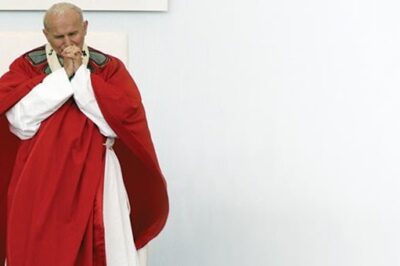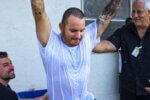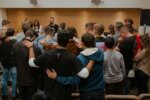Young Lolek awakened with a start in the wee hours of a Polish winter’s night in 1939. In the clearing fog of sleep, he was unsure of what had stirred him, but his senses quickly roared to alert anyway. These were dangerous times. There were war clouds hovering over the land, hunger moved men to desperate measures, and a noise in the frigid night hours could hardly bring good news.
Yet, as Lolek turned up the lamp beside his bed, he realized what had disturbed his rest. His father, Capt. Karol Wojtyla, with whom young Lolek shared a bedroom, was lying face down on the icy floor with his body forming the shape of a cross. He was in prayer and Lolek could hear his words, but it was not the sound that made the deepest impression.
An otherworldly presence filled the room. The sense of invisible darkness gave way to something pure and sweet and loving.
It was the presence of Jesus.
Lolek never lost the sense of that moment and of other moments like it. They were welcome islands of peace in his otherwise violently thrashing world.
He had already known much darkness in his short life. His mother, sister and brother had died. He lived in a land groaning under political oppression and threatened once again by invasion, this time by the Nazi war machine. Yet in the warmth that seemed to form in the air when his father prayed, Lolek found his only respite from the horrors around him.
He came quickly to understand that this was the meaning of life, to know this heavenly being. It was connection to this life that all men yearned for, whether they knew it or not, and that was the answer to the cry of the nations.
Lolek never forgot this. Not when his father died in 1941 and he decided soon after to become a Catholic priest. Not when he later became a bishop and then a cardinal who fought atheistic communism in his beloved Poland. And not when, on October 15, 1978, Lolek became Pope John Paul II, the supreme pontiff of the Roman Catholic Church.
A Believer in Miracles
The world will long be pondering the life and legacy of John Paul II. Pundits will search for the source of his greatness in his Polish roots or his valor amid tragedy or his unswerving devotion to orthodox Catholicism. They will think of him as the perfect pope of a media age, with his mischievous smile, his masculine energy, his love of laughter and his astonishing gifts of communication.
Yet John Paul II can truly be understood only in light of his absolute devotion to the supernatural, in light of his belief in a miracle-working God performing wonders in behalf of those who serve Him.
It is important to remember that, long before the Pentecostal and charismatic movements of recent decades, Catholicism contained a deeply mystical stream that kept alive the supernatural wonders found in the Bible. There were liturgies for healing, casting out demons and impartation of the Holy Spirit. The devoted spoke openly of visions, signs and wonders, miracles, and revelations. Even when the church went astray, this stream of the supernatural continued to flow through a faithful remnant.
Karol Wojtyla, the boy whose friends called him “Lolek,” believed it all. He was raised in a deeply pious home where miracles and intimate knowledge of God’s presence were prized. He also drank deeply from the spiritual traditions of the Poles, a people so mystical and devoted to the miraculous that they have long been called “the Christ nation.”
Indeed, had he looked no further than his own life he would have found ample evidence for the supernatural. The number of times he was miraculously delivered from death proved the point. When he was 10, a playmate aimed his father’s rifle at young Karol as a joke. The boy pulled the trigger and a bullet missed Karol by centimeters.
In 1939, Karol was fleeing Krakow with his father ahead of the Nazi advance. German planes sprayed the group of refugees Karol and his father were among with machine gun fire. Many were killed at Karol’s feet but he was spared.
Later, Karol was arrested in a Nazi roundup and almost sent to Auschwitz. Not long after that, he was hit from behind by a speeding German truck as he walked along a dark road. Left for dead, he lay in a gutter for hours before a woman found him in a comatose state and got him to a hospital.
He might have died, as he certainly would have on another occasion had German soldiers found him when they stormed into his apartment building in 1944. Karol, though, was hidden in prayer in his basement, his body in the same position of the cross he had learned from his father. Again, he was spared.
Each of these deliverances Karol came to see as the miraculous intervention of God.
It was the same with prophetic works of God. When Karol decided as a young priest that he wanted to become a monk, his superiors thought better of it and wrote him, in the church Latin of the time, “Ad maiores res tu es” (“You are made for greater things”). In his later years John Paul II came to see the words as supernaturally inspired.
Not long after, in 1947, Karol was a young priest on vacation making his way to a monastery near Naples where famed mystic Padre Pio often spoke and heard confession. When the little white-bearded monk heard Karol’s voice, he dropped to his knees and prophesied that this young Polish priest would one day become pope. That was more than 30 years before the words were fulfilled. There were other such prophetic confirmations of his call, and after Karol Wojtyla became pope he never forgot them.
Open to the Holy Spirit
This experience with the ongoing work of the Holy Spirit in the modern age made Karol Wojtyla an exceptional man among the clergy in Poland. There were Pentecostals in Poland who were the children and the grandchildren of Poles who first lit their spiritual torches from the fires of Azusa Street and the Welsh revivals.
Father Wojtyla refused to reject them as extremists and heretics. Instead, he believed they had discovered something his church desperately needed. He freely used words such as “renewal” and “Pentecostal rebirth” in his sermons, and it was not uncommon for him to call his flock to a “newness of the Spirit in our time.”
All of this prepared him for his involvement in one of the most decisive moments in the history of the church. In 1959, Pope John XXIII announced a new church council that would come to be known as Vatican II. The cardinals of the church would gather in Rome in 1962 to ponder how the Catholic Church might become more relevant to the modern age and how it might live more in unity with the non-Catholic Christian world.
And Wojtyla, now a cardinal, was there. Indeed, it was reported that some of Pope John XXIII’s pronouncements to the council were written by Wojtyla, known to be a favorite of the aging pope’s.
Two of the decrees of Vatican II were of particular interest to Cardinal Wojtyla. The first was the Decree on Ecumenism, in which the cardinals determined that the church’s previously negative attitude toward other Christian communions was error. The cardinals now maintained that other churches were no longer enemies but “separated brethren” who might have something to teach the Church of Rome.
As the Decree proclaimed, “Whatever is truly Christian can never conflict with the genuine interests of the faith; indeed, it can always result in a more ample realization of the very mystery of Christ and the Church.” This statement was revolutionary and certainly opened the Catholic Church to the influence of Pentecostalism as well other streams that had arisen largely in the Protestant world.
Even more exciting to Pentecostals and charismatics were the words of the council in its Dogmatic Constitution on the Church. Asked to ponder whether there ought to be a role for the gifts of the Spirit in the modern church, the cardinals concluded, “These charismatic gifts … are to be received with thanksgiving and consolation, for they are exceedingly suitable and useful for the needs of the church.”
A new day had dawned, what many considered to be a welcoming of the Holy Spirit afresh to the Roman Catholic world.
Cardinal Wojtyla took the council’s words as a mandate. In the decade following Vatican II, he did all in his power to invite the Holy Spirit and non-Catholic people of the Spirit to Poland.
He welcomed charismatic music groups to Poland, such as Living Sound, a worship band under the direction of Terry Law that first arose from the student body at Oral Roberts University. He also encouraged Catholic charismatic conferences in Poland. At one of these he reportedly joined hands with other Catholics in a circle and danced “in the Spirit” as a celebration of Pentecost.
Had he never become pope, Cardinal Wojtyla’s openness to the work of the Holy Spirit would have simply been testimony to the broadmindedness of a Polish clergyman. When he became pope, though, he was in a position to deepen the place for charismatic life that had been pioneered under Pope John XXIII, Pope Paul VI and the brief term of Pope John Paul I.
Charismatic Fire
Shortly after assuming the papacy, John Paul II spoke out about the charismatic renewal then under way in the church and urged local priests to participate.
“The priest, for his part, cannot exercise his service on behalf of the renewal unless and until he adopts a welcoming attitude toward it,” the new pope proclaimed. Young priests around the world heard the call and began to drink from the rivers of spiritual renewal then flowing in almost every nation.
John Paul II married action to vision. He had already welcomed the International Catholic Charismatic Renewal Office (ICCRO) under the direction of Léon-Joseph Cardinal Suenens, the archbishop of the see of Malines-Brussels in Belgium. Suenens had been an influential figure at Vatican II and a patron to the growing Catholic charismatic movement.
John Paul II confirmed Suenens’ oversight of the renewal and invited the ICCRO to operate from within the walls of the Vatican. It was an astonishingly gracious affirmation of both the renewal and the work of the ICCRO itself.
Yet the pope also modeled this welcoming of the Spirit in his own life. Aides reported hearing loud groans emanating from the pope’s private prayer chapel as the pontiff gave himself to intercession. One theological adviser recounted: “He remains a mystery to me. He begins to pray, and five minutes later he forgets anyone is around.”
The spirit of prayer that pervaded John Paul II’s life was attested by many who met him. Even Protestant leaders, some of whom were leery of John Paul’s devotion to Mary and often mystical doctrines, were moved by his spirituality. A prominent American pastor who was interviewed for this article but who asked to be unnamed recounted the occasion when he was granted an audience with the pope:
“The time came for the pope’s afternoon prayer time. He asked me to join him, and when he buried his face in his hands to pray there was such a rush of holiness … that I wasn’t sure I could stand. I can only hope for the same kind of anointing for prayer in my own life.”
What confirmed to many that the pope was devoted to charismatic distinctions was his vision for the dawn of the new millennium to be a time of “jubilee” for the Roman Catholic Church. The pope summoned his global flock to preparation for a fresh work of the Holy Spirit, called Jubilee 2000, as the “third day” of Christianity arrived. Yet John Paul II understood that renewal came at a price.
“This will only come on the wings of repentance,” he insisted. Understanding that he was breaking ancient strongholds through repentance, the pope apologized to Orthodox believers, Protestants and Jews for Catholic sins.
He became the first pope to enter a synagogue, the first to apologize for the Holocaust and the first to call the Jews “our elder brothers.” He even visited the Wailing Wall in Jerusalem and slipped a prayer of repentance between the surviving stones of the ancient temple.
Clearly, he wanted his church to get clean in anticipation of a renewing work of the Spirit. It broke his heart, then, when the pedophilia scandals broke out just as he was hoping for a new holiness in his flock. He endured fiery personal criticism at his handling of the affair and saw the focus of many Catholics tragically diverted from his hopes for a revival of Pentecost.
Undaunted, he continued to insist that a great day of Christian unity and revival was just ahead. Indeed, even from his deathbed he issued words of hope and reliance on the Holy Spirit to the crowds in St. Peter’s Square.
What the pope knew and devoted his life to was the certainty that mankind is incomplete without the indwelling of the Holy Spirit. John Paul II first learned this as his father prayed on a winter’s night in Poland. He continued to believe this when he witnessed hunger for the Holy Spirit across denominational lines. By the end of his life, he was convinced that renewal was the answer to the crises of our age.
John Paul II is sure to be canonized, or made a saint, by the church, and he is sure to go down in history as John Paul the Great. As the generations remember him, it is essential that they recall not just the man of moral fire, the freedom-loving son of Poland, or the passionate defender of Catholic orthodoxy.
They must also remember the man who stood at the doors of the Vatican at the dawn of the new millennium and said before a listening world: “We welcome You, Spirit of Jesus. Come in Your renewing power and save us from the horrors we have created.” Surely Christian believers of all streams and traditions can echo such a cry.
Stephen Mansfield is a Protestant leader who admired John Paul II for his moral courage and devotion to the Holy Spirit. He is the author of The Faith of George W. Bush, a New York Times best-seller, and the newly released The Faith of the American Soldier, both from Charisma House. For more, log on to www.mansfieldgroup.com.
Welcoming “A New Pentecost”
Benedict XVI has stated that he supports charismatic renewal.
At the end of the 19th century, Pope Leo XIII wrote an encyclical letter on the Holy Spirit and dedicated the 20th century to Him. Just a few years later, the Azusa Street revival erupted–introducing a new Pentecost to many denominations.
Other recent popes have been open to the Spirit. Pope John XXIII (1958-1963) asked the entire Catholic Church to pray to the Holy Spirit for one year before the Second Vatican Council began. He asked God: “Renew Your wonders in this our day as by a new Pentecost.”
Charismatic renewal broke out in the Catholic Church in 1967 when Paul VI was pope (1963-1978). He called the charismatic renewal a “blessing, a chance for the Church and for the whole world.”
Pope John Paul II (1978-2005) addressed Catholic charismatic groups on more than 25 occasions. He called the movement “a force for the renewal of the Church.” In 1979 he told believers: “I have always belonged to this renewal in the Holy Spirit.”
While meeting with some 500,000 representatives of various movements in the Catholic Church on the Eve of Pentecost 1998, John Paul boldly proclaimed: “Open yourselves docilely to the gifts of the Spirit! Accept gratefully and obediently the charisms which the Spirit never ceases to bestow on us.”
The newly elected pope, Joseph Ratzinger–now named Benedict XVI–indicated his openness to the charismatic movement while he was a cardinal in Germany. In his book The Ratzinger Report, he states that renewal movements point to “a Pentecostal hour in the Church.”
He writes: “I find it marvelous that the Spirit is once more stronger than our programs and brings himself into play in an altogether different way than we had imagined. … The task of the office-holders in the Church and of theologians is to keep the door open to [renewal movements], to prepare room for them.”
Ratzinger also affirmed Pope John XXIII’s prayer for a new Pentecost. He said that his prayer “did not go unheard.”
He noted: “A new experience of the Holy Spirit has come about, amounting to a worldwide renewal movement. What the New Testament describes, with reference to the charisms as visible signs of the coming of the Spirit is no longer merely ancient, past history–this history is becoming a burning reality today.”
As leaders in the Catholic charismatic renewal for many years, we are full of hope that this “Pentecostal hour” will grow stronger under the papacy of Benedict XVI. May the New Testament vision be fulfilled when all believers will be united in the Holy Spirit, proclaiming that Jesus Christ is Lord to the glory of God the Father.
Al and Patti Mansfield are veteran leaders in Catholic renewal. Patti was part of the Duquesne Weekend, a 1967 revival that marked the beginning of the charismatic renewal in the Catholic Church. She has authored several books, including As By a New Pentecost. The Mansfields live in New Orleans.







Leave a Comment
You must be logged in to post a comment.